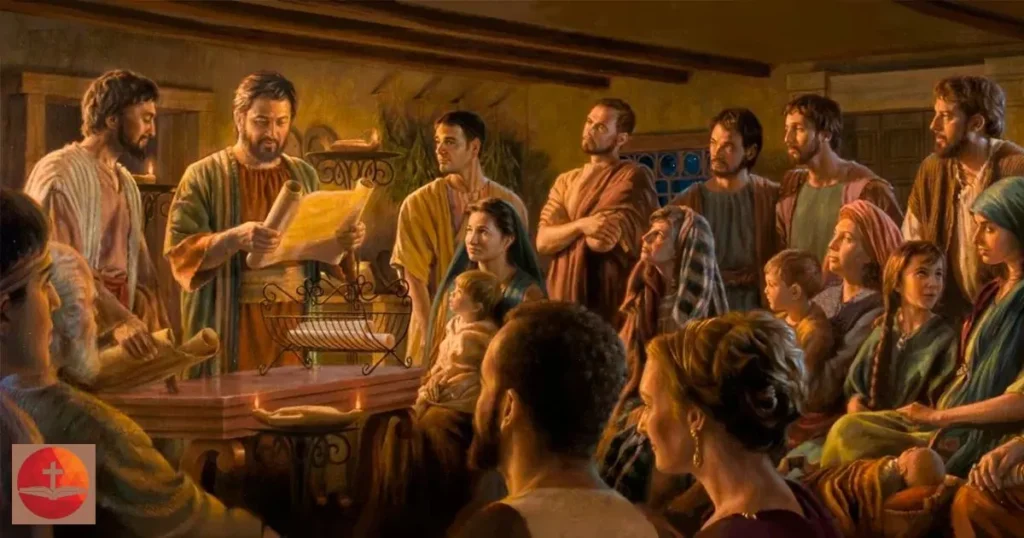“Caring for the hungry reflects God’s love in action.”
Throughout the Bible, feeding the hungry is a central theme that underscores compassion and service. God calls us to help those in need, reminding us of the importance of generosity and kindness.
In this article, we will explore 40 powerful Scriptures that highlight the significance of providing for the hungry. Each verse is accompanied by an explanation and example, demonstrating how we can live out these teachings in our daily lives.
1. Matthew 25:35
“For I was hungry and you gave me something to eat, I was thirsty and you gave me something to drink…”
Explanation: Jesus identifies Himself with the needy, emphasizing the importance of serving others.
Example: Volunteering at a local food bank is a way to respond to this call.
2. Proverbs 22:9
“The generous will themselves be blessed, for they share their food with the low in come.”
Explanation: Generosity leads to blessings, both for the giver and the receiver.
Example: Donating a portion of your groceries to those in need fosters community support.
3. Isaiah 58:10
“If you spend yourselves in behalf of the hungry and satisfy the needs of the oppressed, then your light will rise in the darkness…”
Explanation: Serving the hungry brings light to our lives and communities.
Example: Organizing a community meal can illuminate hope for those in despair.
4. Luke 3:11

“John answered, ‘Anyone who has two shirts should share with the one who has none, and anyone who has food should do the same.'”
Explanation: Sharing our abundance is a practical way to care for others.
Example: Holding a clothing drive along with food donations can meet multiple needs.
5. James 2:15-16
“Suppose a brother or sister is without clothes and daily food. If one of you says to them, ‘Go in peace; keep warm and well fed,’ but does nothing about their physical needs, what good is it?”
Explanation: Words alone are not enough; action is required to truly help.
Example: Instead of just offering kind words, actively provide meals for those in need.
6. Deuteronomy 15:11
“There will always be poor people in the land. Therefore I command you to be openhanded toward your fellow Israelites who are poor and needy in your land.”
Explanation: We are called to be generous, acknowledging that poverty exists.
Example: Create a community fund to help those who struggle financially.
7. Psalm 146:7
“He upholds the cause of the oppressed and gives food to the hungry. The Lord sets prisoners free.”
Explanation: God’s concern for the hungry and oppressed is clear in this verse.
Example: Partnering with local ministries to provide meals can support God’s mission.
8. Matthew 14:16
“Jesus replied, ‘They do not need to go away. You give them something to eat.'”
Explanation: Jesus encourages us to take action in feeding others.
Example: Organizing a potluck can foster community while addressing hunger.
9. Mark 6:37
“But he answered, ‘You give them something to eat.’ And they said to him, ‘That would take more than half a year’s wages! Are we to go and spend that much on bread and give it to them to eat?'”
Explanation: Jesus challenges us to think creatively about providing for others.
Example: Finding local resources and partnerships can help meet food needs without overwhelming costs.
10. 1 John 3:17
“If anyone has material possessions and sees a brother or sister in need but has no pity on them, how can the love of God be in that person?”
Explanation: Genuine love for God reflects in our actions toward others.
Example: Assess your resources and consider how you can help those who are struggling.
11. Exodus 16:16
“This is what the Lord has commanded: ‘Everyone is to gather as much as they need. Take an omer for each person you have in your tent.'”
Explanation: God provides for our needs, and we are called to share.
Example: Encouraging families to share food resources can build a sense of community.
12. Luke 14:13-14
“But when you give a banquet, invite the low-income, the physically disabled.the sad, the blind, and you will be blessed…”
Explanation: Inviting those in need to share in our abundance is a blessing.
Example: Hosting a community dinner that includes all can foster inclusivity and care.
13. Matthew 6:1-2
“Be careful not to practice your righteousness in front of others to be seen by them. If you do, you will have no reward from your Father in heaven.”
Explanation: Helping the hungry should come from a genuine heart, not for recognition.
Example: Provide anonymous assistance to those in need without seeking praise.
14. Acts 20:35
“In everything I did, I showed you that by this kind of hard work we must help the weak, remembering the words the Lord Jesus himself said: ‘It is more blessed to give than to receive.'”
Explanation: Helping the weak is a fundamental aspect of our faith.
Example: Engage in service projects that focus on supporting vulnerable populations.
Bible Verses on Everything Will Be Okay
15. Galatians 6:2
“Carry each other’s burdens, and in this way, you will fulfill the law of Christ.”
Explanation: Supporting those in need is a way to live out Christ’s teachings.
Example: Participate in initiatives that provide meals and support for families in crisis.
16. Proverbs 19:17
“Whoever is kind to the poor lends to the Lord, and He will reward them for what they have done.”
Explanation: Kindness to the low-income is seen as service to God Himself.
Example: Start a community garden to provide fresh produce for the needy.
17. Isaiah 58:7
“Is it not to share your food with the hungry and to provide the poor wanderer with shelter—when you see the naked, to clothe them, and not to turn away from your own flesh and blood?”
Explanation: True fasting includes caring for those in need.
Example: Organizing clothing drives alongside food donations can serve multiple needs.
18. Luke 6:38
“Give, and it will be given to you. A good measure, pressed down, shaken together and running over, will be poured into your lap.”
Explanation: Generosity often leads to unexpected blessings.
Example: Contributing to local charities can lead to more opportunities to help others.
19. 1 Timothy 6:18
“Command them to do good, to be rich in good deeds, and to be generous and willing to share.”
Explanation: We are instructed to actively engage in good works.
Example: Encourage your church or community group to support food drives regularly.
20. Matthew 15:37
“Everyone ate and was satisfied, and the disciples picked up seven basketfuls of broken pieces that were left over.”
Explanation: God provides abundantly when we share what we have.
Example: Create meal-sharing programs that ensure no one goes hungry.
21. Psalm 107:9
“For He satisfies the thirsty and fills the hungry with good things.”
Explanation: God meets our needs in profound ways.
Example: Trust that by sharing resources, you’re participating in God’s provision.
22. Ezekiel 18:7
“He does not oppress anyone, but returns what he took in pledge for a loan. He does not commit robbery but gives his food to the hungry and provides clothing for the naked.”
Explanation: Righteous living includes caring for those in need.
Example: Ensure your business practices are fair and contribute to the welfare of your community.
23. John 6:35
“Then Jesus declared, ‘I am the bread of life. Whoever comes to me will never go hungry, and whoever believes in me will never be thirsty.'”
Explanation: Jesus offers spiritual sustenance alongside physical needs.
Example: Share not only meals but also spiritual encouragement with those in need.
24. 2 Corinthians 9:7
“Each of you should give what you have decided in your heart to give, not reluctantly or under compulsion, for God loves a cheerful giver.”
Explanation: Giving should come from a joyful heart.
Example: Engage in acts of kindness that you’re passionate about to foster genuine giving.
25. Psalm 132:15
“I will bless her with abundant provisions; I will satisfy her poor with food.”
Explanation: God promises provision for those who serve others.
Example: Create partnerships with local businesses to secure food for those in need.
26. Lamentations 3:22-23
“Because of the Lord’s great love, we are not consumed, for His compassions never fail. They are new every morning; great is your faithfulness!”
Explanation: God’s compassion inspires us to extend kindness to others.
Example: Start each day with gratitude, prompting you to serve others well.
27. Matthew 9:36
“When He saw the crowds, He had compassion on them, because they were harassed and helpless, like sheep without a shepherd.”
Explanation: Jesus models compassion for the needy.
Example: Allow your heart to break for those in need and respond with action.
28. Leviticus 19:10
“Do not go over your vineyard a second time or pick up the grapes that have fallen. Leave them for the low-income and the foreigner. I am the Lord your God.”
Explanation: God commands us to leave resources for the needy.
Example: Consider how your excess can be shared with those in need.
29. Romans 12:13
“Share with the Lord’s people who are in need. Practice hospitality.”
Explanation: Community support and hospitality are key components of faith.
Example: Invite neighbors who are struggling to share a meal with your family.
30. 1 Peter 4:10
“Each of you should use whatever gift you have received to serve others, as faithful stewards of God’s grace in its various forms.”
Explanation: Our gifts should be used to serve those in need.
Example: Utilize your cooking skills to prepare meals for those who cannot cook for themselves.
31. Job 31:17-18

“Or if I have never eaten my meals alone but shared them with orphans—my childhood was spent with orphans.”
Explanation: Job illustrates the importance of sharing meals and life with those in need.
Example: Make it a habit to invite others to join your family meals.
32. Isaiah 41:17
“The low-income and needy search for water, but there is none; their tongues are parched with thirst. But I the Lord will answer them; I, the God of Israel, will not forsake them.”
Explanation: God promises to provide for those in need.
Example: Be an instrument of God’s provision through your actions and resources.
33. Ezekiel 34:3
“You eat the curds, clothe yourselves with the wool, and slaughter the choice animals, but you do not take care of the flock.”
Explanation: Leaders are responsible for caring for those they lead.
Example: If you have influence, ensure those under your care are supported and nourished.
34. 2 Thessalonians 3:10
“For even when we were with you, we gave you this rule: ‘The one who is unwilling to work shall not eat.'”
Explanation: There is dignity in work, but we must still help those who struggle.
Example: Offer support and training to help the unemployed find work.
35. Zechariah 7:10
“Do not oppress the widow or the fatherless, the foreigner or the low-income. Do not plot evil against each other.”
Explanation: We are called to protect the vulnerable in society.
Example: Advocate for policies that support food security and assistance for the needy.
36. Proverbs 28:27
“Those who give to the low-income will lack nothing, but those who close their eyes to them receive many curses.”
Explanation: Generosity toward the poor leads to blessings.
Example: Regularly support local charities focused on feeding the hungry.
37. Luke 12:33
“Sell your possessions and give to thelow-income. Provide purses for yourselves that will not wear out, a treasure in heaven that will never fail…”
Explanation: Investing in the needs of others has eternal rewards.
Example: Downsize your possessions and use the proceeds to support those in need.
38. Matthew 5:42
“Give to the one who asks you, and do not turn away from the one who wants to borrow from you.”
Explanation: Generosity should be our default response.
Example: Create an open-door policy where neighbors feel comfortable asking for help.
39. Psalm 37:25
“I was young and now I am old, yet I have never seen the righteous forsaken or their children begging for bread.”
Explanation: God cares for the righteous and their needs.
Example: Trust in God’s provision as you help others find their way.
40. John 21:15
“When they had finished eating, Jesus said to Simon Peter, ‘Simon son of John, do you love me?’ ‘Yes, Lord,’ he said, ‘you know that I love you.’ Jesus said, ‘Feed my lambs.'”
Explanation: Loving Jesus means caring for His people.
Example: Volunteer to mentor young people and provide for their basic needs.
ANSWER TO KEY QUESTION
1. Why is feeding the hungry important in the Bible?
Feeding the hungry reflects God’s love and compassion, showing our care for others.
2. How can I get involved in helping the hungry?
You can volunteer at food banks, organize food drives, or donate to local charities.
3. What are some practical ways to share food?
Consider hosting community meals or sharing leftovers with those in need.
4. Does the Bible say anything about food waste?
Yes, the Bible encourages us to be responsible with our resources and share with the needy.
5. How can my church support the hungry?
Your church can organize outreach programs, food drives, and community meals.
6. What is the spiritual significance of feeding the hungry?
It reflects God’s heart for humanity and fulfills His command to love our neighbors.
Conclusion
Feeding the hungry is a vital expression of our faith and love for others. The Scriptures remind us of our responsibility to care for those in need, encouraging us to act with generosity and compassion.
As we take these teachings to heart, let us find ways to put them into action, sharing not only food but also hope and love within our communities. By doing so, we reflect God’s heart and make a lasting impact on those around us.

Hi! I’m James Whitman, the admin of Bible Pulze. I have a deep passion for sharing the wisdom and teachings of the Bible. Through our website, I aim to make the scriptures more accessible and engaging for everyone. Whether you’re looking for inspiration, guidance, or a deeper understanding of the Bible, I’m here to help you on your spiritual journey.

